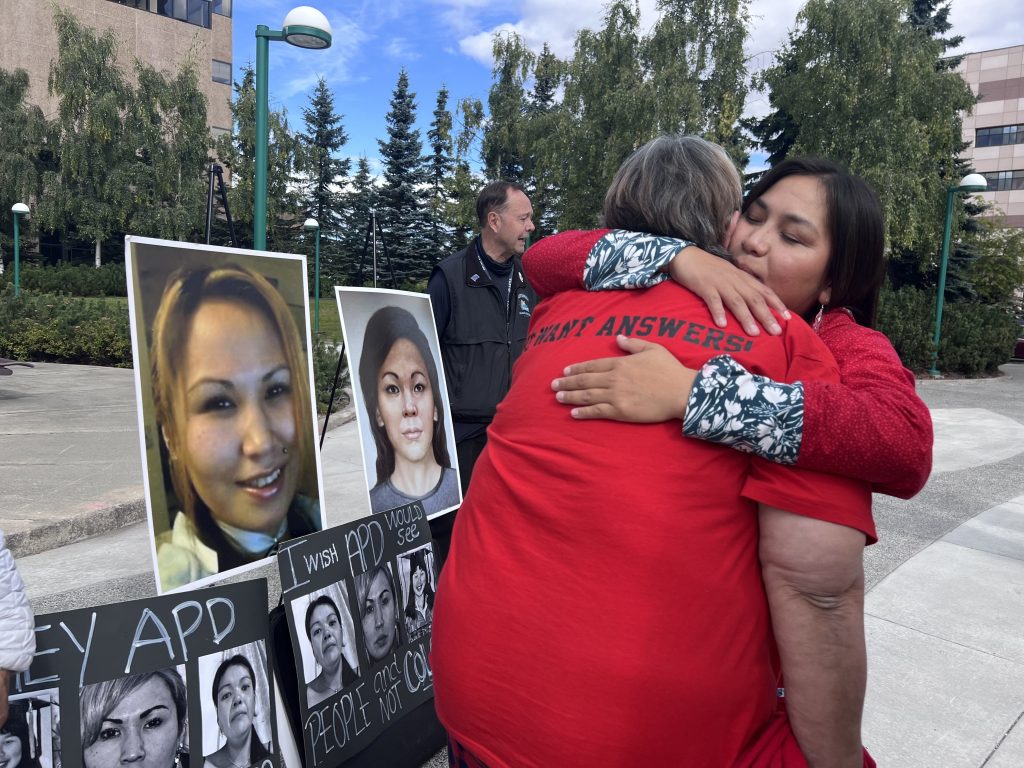Podcast: Play in new window | Download | Embed
Photo: Antonia Commack hugs Terrie Boskofsky. (Rhonda McBride)
Presumptive death hearings are common in Alaska.
Hikers, hunters, and boaters often go missing, never to be seen again.
But there are also those who disappear from the streets of Anchorage, like three Alaska Native women who crossed paths with serial killer Brian Smith.
Earlier this year, Smith was convicted of murdering two of the women earlier but never charged in the death of a third victim.
As KNBA’s Rhonda McBride tells us, her family used a novel court procedure to seek justice.
The five-year commemoration of Cassandra Boskofsky’s death is coming up this month.

(Photo: Rhonda McBride)
Her photographs were found on Brian Smith’s cellphone in October of 2019 shortly after his arrest — battered, bloody and lifeless images — that were made public just before Smith’s sentencing this summer.
In a courtroom last week, poster-sized images of those photos were on display at a trial the family requested to receive a death certificate.
Michael Livingston, an advocate for an advocate for Missing and Murdered Indigenous people, helped her family prepare.
“During the trial, we didn’t have an attorney. We were just bunch of bumbling amateurs doing the best we could. I think everything considered, we did pretty good.”
In a procedure known as a presumptive death hearing, it’s the family’s main job was to prove to a jury of six people that Boskofsky is no longer alive, something the Anchorage police have yet to confirm. But Judge Brian Clark told the court the standard of proof is lower than it would be in a criminal trial.
“So if you find more than 50% that something is true, it is in fact true under the law for this kind of a hearing.”
Truth is what the family hoped the trial would bring to light.
With a judge and jury present, they could demand answers.
One of Cassandra’s cousin’s, Marcella Boskofsky-Grounds, oversaw the hearing.
“Det. Lee, is that Brian Steven Smith’s foot in the photographs?”
Boskofsky-Ground’s first witness to the stand was Det. Brendan Lee, who revealed for the first time that a patrol officer had identified Cassandra in the photos almost five years ago.
One of the lingering questions for the family: Why did it take police so long to share what they knew?
“To this day, at the Anchorage Police Department, we have not been able to 100 percent identify the female in the photos as Cassandra.”
That’s because her remains have yet to be found. In the end the jury sided with the Boskofsky family – and decided that with or without remains – Cassandra is not only dead, but also a victim of a homicide.
Antonia Commack, an advocate for the Boskoskofski family, calls this an important victory.
“They didn’t have to put down homicide, but they did. They could have put down unknown, but they put down homicide and that’s huge.”
Commack says she hopes the Boskofsky’s success will help other MMIP families navigate the criminal justice system.

The group of participants at the Wyoming Wildflower Women Climbing 101 event at Sinks Canyon outside of Lander. (Photo: Hannah Habermann / Wyoming Public Media)
This summer, Wyoming State Parks started partnering with Shoshone and Arapaho Fish and Game to bring more folks into their all-women’s outdoor program.
Wyoming Public Radio’s Hannah Habermann joined the group for a day of climbing outside of Lander.
On a sunny Sunday afternoon, a group of nearly twenty women put on harnesses, tie into ropes and try their hand at climbing on pocketed limestone rock faces. They’re with Wyoming Wildflower Women, which organizes all-women outdoor adventures around the state.
Jolene Brown is Northern Arapaho and is a special-ed teacher at Arapaho Elementary School.
“Honestly, I would have never come rock climbing if, you know, if it wasn’t offered. I’m scared of heights, and that’s probably not something I would have done. So, I got out of my comfort zone a little bit.”
Brown’s been bringing her co-worker Kelli Davis with her to programs throughout the summer. As for next year?
“I’ll try and come back with her. And be with her all the way, I guess”
Get National Native News delivered to your inbox daily and stay up-to-date on the 2024 Native Vote. Sign up for our daily newsletter today.



